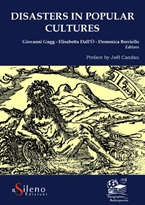Con specifico riferimento alla lotta contro IS, in senso retrospettivo, l’Iran ha giocato un ruolo chiave in ambito siro-iracheno (il c.d. Syrak) attraverso una azione multiforme, incrementando la sua capacità expeditionary. Continue reading
Terrorismo a Mosca: vicenda da capire e da approfondire – By Giovanni Giacalone
Mercoledì 19 dicembre intorno alle 18:10 (ora locale) un soggetto armato ha aperto il fuoco all’esterno dell’edificio del Fsb, in piazza Lubyanka a Mosca, per poi fuggire in una via laterale dove si è barricato all’interno di un caseggiato. Continue reading
Mental health issues and terrorism: a vaccine for the “Uomo Terrorista”? – by Maria Chr. Alvanou and Marco Lombardi
More and more the issue of mental health issues in terrorism comes up as a theme for discussion. While during the ‘70s and ‘80s the discussion about terrorism had mainly a political connotation and after 9/11 it focused on religion, now days there is a trend more and more to search the mental health question. For the Western media and public it is almost certain that e.g. terrorists who blow themselves up must be crazy. How can they not be? Continue reading
L’operazione “Referral Action Days” di Europol – by Federico Borgonovo e Nicolò Spagna
Il 21 novembre 2019 un’operazione coordinata da Europol in concerto con Telegram denominata Referral Action Days, ha disabilitato aggressivamente l’ecosistema mediatico dello Stato Islamico (IS). L’operazione si è contraddistinta dalle precedenti per la sua efficacia, andando a colpire non solo i canali e gruppi ma gli account delle diverse piattaforme, in particolare Telegram. Continue reading
Estrema Destra, Dresda e l’emergenza nazismo – by Barbara Lucini
La scorsa settimana a Dresda – capitale del Laender Sassonia, il consiglio comunale della città ha votato con 39 voti a favore e 29 contrari una mozione per dichiarare lo stato di emergenza per la situazione relativa all’estremismo nazista. Continue reading
Disasters in Popular Cultures: la cultura come strategia di resilienza ai disastri
E’ stato presentato questa mattina (07 Novembre) in Università Cattolica, il libro “Disasters in Popular Cultures” di Giovanni Gugg, Elisabetta Dall’O’, Domenica Borriello, con prefazione di Joël Candau, Edizioni Il Sileno. Continue reading
The legacy of the “caliph”. Opportunities and vulnerabilities in the post al-Baghdadi Islamic State – by D. Plebani
Continuity is essential in every organization, including terrorist groups. This principle seems to be crucial for Islamic State (IS), bound since its beginning to the idea of a “caliph” according to its interpretation of the “methodology of prophethood”[1]. Continue reading
L’eredità del “califfo”. Scenari e vulnerabilità di Stato Islamico dopo al-Baghdadi – by Daniele Plebani
La continuità del potere è un aspetto fondamentale nella gestione di ogni organizzazione. (Go here for the English version.) Questo principio risulta tanto più importante per il gruppo Stato Islamico, configurato intorno all’idea stessa di “califfo” secondo una propria interpretazione della “metodologia dei profeti”[1]. Continue reading
La morte di Al-Baghdadi: prime considerazioni – by Marco Lombardi
Questa mattina gli americani ci informano della morte del leader di Daesh, Al-Baghdadi. Il Califfo si sarebbe fatto saltare in aria attivando la cintura da suicida che portava, morendo insieme a un paio di mogli quando scovato dalla operazione delle forze speciali del Delta Team americano. In totale 9 morti durante l’assalto al compound dove si trovava a Barisha, in provincia di Idlib, a 5 chilometri dal confine turco. Continue reading
Soft Skill e competenze necessarie per la gestione di minacce attuali e future – by Barbara Lucini
L’instabilità socio-politica diffusa di questi ultimi mesi, rappresentata da proteste e aperti scontri violenti nelle piazze di molte città del mondo e il differente profilo assunto dai nuovi scenari della minaccia terroristica, deve necessariamente interrogare chi si occupa della risposta a questi eventi. Continue reading
September 11 attacks: European aspects – by Maria Chr. Alvanou
September 11 will surely be remembered as one of the most tragic events in the history of the United States. A surprise attack on American soil that caused death, destruction and injuries to the specific target locations, as well as trauma and shock to a whole population. Continue reading
Terrorismo o non Terrorismo? La duplice definizione dello stesso fenomeno – Barbara Lucini
Fino ad ora l’attenzione verso lo studio e l’analisi delle dinamiche comunicative nel contesto di azioni terroristiche considerava la comunicazione, come strumento tipico del terrorismo e del terrorista, utile per essere consapevoli delle strategie utilizzate, comprendere e rintracciare segnali predittivi di fenomeni estremisti ed eversivi. Continue reading









